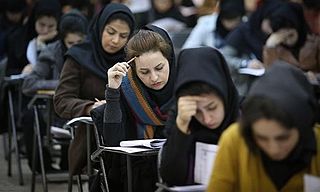Concours or EU concours is a recruitment competition and examination to select staff to all institutions of the European Union.
Concours or EU concours is a recruitment competition and examination to select staff to all institutions of the European Union.
According to the web site of the European Personnel Selection Office, whose mission is to organise and administer open competitions to select staff for recruitment to all institutions of the EU, all permanent staff for the EU institutions are recruited through open competitions (commonly referred to as concours in all languages, originally referring to the French public administration's recruitment exams).
These attract a very considerable number of applicants from all over Europe.
Passing the competition is the principal way to become a permanent official in an EU institution. Other smaller competitions may provide an entry route to the select few.
Regarding non-permanent jobs like temporary agents, a similar selection takes place.
EU open competitions are published in the C series of the Official Journal (OJ) of the European Union.
The OJ gives the specific conditions and requirements for each published competition, along with an indication of the number of posts available.
A third level diploma is normally required, and EU citizenship. Candidates must have at least two EU languages: both a 'main language', which can be any of the 24 EU languages, and a 'second language', which must be English, German, or French. The concours tests both languages.
There are usually 3 stages to each competition.
The pre-selection tests normally cover
The candidate normally has to take the pre selection test in the second language. It usually consists of multiple choice questions.
Written tests involve essay-type exams and candidates may have to write something based on analysis of information provided. The first and second language may be required.
The interview may test both languages.
Examination centres are frequently set up in each member state – sometimes more than one centre in larger countries – but the interviews are generally held in Brussels or Luxembourg.
The number of positions is not communicated. Only the number of places on the reserve list is always stated in the notice of competition.
This number indicates how many successful candidates will be placed on the reserve list, however, it does not guarantee that all of them will actually get a job.
Many candidates change their minds throughout the application process, so positions that appear to be filled sometimes become available.
The civil service is a collective term for a sector of government composed mainly of career civil servants hired rather than appointed or elected, whose institutional tenure typically survives transitions of political leadership. A civil servant, also known as a public servant, is a person employed in the public sector by a government department or agency for public sector undertakings. Civil servants work for central and state governments, and answer to the government, not a political party.

The imperial examination was a civil-service examination system in Imperial China administered for the purpose of selecting candidates for the state bureaucracy. The concept of choosing bureaucrats by merit rather than by birth started early in Chinese history, but using written examinations as a tool of selection started in earnest during the Sui dynasty (581–618) then into the Tang dynasty of 618–907. The system became dominant during the Song dynasty (960–1279) and lasted for almost a millennium until its abolition during the late Qing dynasty reforms in 1905. Aspects of the imperial examination still exist for entry into the civil service of contemporary China, in both the People's Republic of China (PRC) and the Republic of China (ROC).
Civil service examinations are examinations implemented in various countries for recruitment and admission to the civil service. They are intended as a method to achieve an effective, rational public administration on a merit system for recruiting prospective politicians and public sector employees.
A cram school, informally called crammer and colloquially also referred to as test-prep or exam factory, is a specialized school that trains its students to achieve particular goals, most commonly to pass the entrance examinations of high schools or universities. The English name is derived from the slang term cramming, meaning to study hard or to study a large amount of material in a short period of time.
University admission or college admission is the process through which students enter tertiary education at universities and colleges. Systems vary widely from country to country, and sometimes from institution to institution.
Common Entrance Examinations are taken by independent school pupils in the UK as part of the selective admissions process at age 13, though ten independent schools do select at 11 using different test papers. They are set by the Independent Schools Examinations Board. Most of the secondary schools that use Common Entrance for admission are "public schools"; most of the schools that routinely prepare their pupils for Common Entrance are preparatory schools. Both kinds of schools are normally fee-paying, that is, they are particular kinds of private schools. The examination papers are prepared by the board, but the scripts are marked by the schools concerned; and all other aspects of the admissions process are handled independently by each school.
Verbal reasoning is understanding and reasoning using concepts framed in words. It aims at evaluating ability to think constructively, rather than at simple fluency or vocabulary recognition.
The Civil Services Examination (CSE) is a national competitive examination in India conducted by the Union Public Service Commission for recruitment to higher Civil Services of the Government of India, including the Indian Administrative Service, Indian Foreign Service, and Indian Police Service. It is also colloquially referred to as the UPSC examination, and UPSC CSE. and is conducted in three phases: a preliminary examination consisting of two objective-type papers, and a main examination consisting of nine papers of conventional (essay) type, in which two papers are qualifying and only marks of seven are counted; finally followed by a personality test (interview). A successful candidate sits for 32 hours of examination during the complete process spanning around one year.

The European Personnel Selection Office (EPSO) is responsible for selecting staff to work for the institutions and agencies of the European Union including the European Parliament, the European Council, the Council of the European Union, the European Commission, the European Court of Justice, the Court of Auditors, the European External Action Service, the Economic and Social Committee, the Committee of the Regions and the European Ombudsman. Each institution is then able to recruit staff from among the pool of candidates selected by EPSO. On average, EPSO receives around 60,000-70,000 applications a year with around 1,500-2,000 candidates recruited by the European Union institutions.

The European Civil Service is a generic term applied to all staff serving the institutions and agencies of the European Union (EU). Although recruitment is sometimes done jointly, each institution is responsible for its own internal structures and hierarchies.
The United Nations Competitive Recruitment Examination is a competitive examination, part of three step selection process for a permanent position with the United Nations consisting of: a written examination, interview, and two year probationary post.
The Agrégation de Lettres classiques (Classics) and its peer, the Agrégation de Grammaire, are higher-level French competitive examinations held to recruit, in principle, senior secondary school teachers – though many of its laureates are in fact university teachers, whether lecturers or professors.
The Ecoles Centrales Group is an alliance, consisting of following grandes écoles of engineering:

The Iranian University Entrance Exam, simply known as Konkour, is a standardized test used as one of the means to gain admission to higher education in Iran. Generally, to get a Ph.D. in non-medical majors, there are three exams, all of them called Konkour.

The Maharashtra Public Service Commission (MPSC) is a body created by the Constitution of India under article 315 to select Group 'A' and Group 'B' civil servants for the Indian state of Maharashtra according to the merits of the applicants and the rules of reservation.

An examination or test is an educational assessment intended to measure a test-taker's knowledge, skill, aptitude, physical fitness, or classification in many other topics. A test may be administered verbally, on paper, on a computer, or in a predetermined area that requires a test taker to demonstrate or perform a set of skills.
The Institut national des études territoriales is a French Public administration school. INET offers initial and continuing training to managerial staff of large local and regional authorities. Most of the students from the INET become directors or head of department in towns of more than 80 000 inhabitants, departments or regions. Some of them start political careers and become French deputies or local politicians.
The BCS Examination is a nationwide competitive examination in Bangladesh conducted by the Bangladesh Public Service Commission (BPSC) for recruitment to the various Bangladesh Civil Service cadres, including BCS (Admin), BCS, BCS (Taxation), BCS, BCS, and BCS (Police) among others. The examination is conducted in three phases - the preliminary examination, the written examination and the viva voce. Candidates appear for different courses to pass those exam phases. The process from the notification of the preliminary examination to declaration of the final results takes one-and-a-half to two years.
Combined Graduated Level Examination (In short known as 'CGL Exam' or 'CGLE') is an examination conducted by the Staff Selection Commission to recruit Group B and C officers to various posts in top ministries, departments and organisations of Government of India. The Staff Selection Commission was established in 1975.
The Certificat d'aptitude au professorat de l'enseignement du second degré is a professional diploma from the French Ministry of National Education, Higher Education and Research. It is awarded to candidates who, after passing the tests of a recruitment competition, have been admitted to the professional qualification examination.